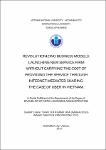| dc.description.abstract | Through a few decades ago, business sectors provided manner to change modes of utilization that progressively test sole ownership as the main method for getting product benefits. These alleged sharing economy phenomena are described toward no ownership, impermanent access, and material products’ redistribution or assets which are intangible for example time, money. In addition, these frameworks vigorously depend on new technologies such as information or communication, making the manifestation about consumption exceedingly shareable, accessible, convenient, flexible. I think it is necessity to talk about two points: (1) the irregularities and problems arising within a given sharing network, and (2) the externalities that go beyond it. In this research I will (1) give a diagram of the sharing marvel in Vietnam and (2) propose a motivational reason of sharing, the social psychological hypothesis. Besides, I will (3) look at the thought processes in and demeanors towards sharing among individual driver who take an interest in business sharing settings of Uber. At long last, (4) in the conclusion and talk of the outcomes, I will give suggestions to further research on Internet-mediated sharing business model. This study used a qualitative research method. Data were collected via semi-structured interviews. Informants were chose from a number of community via Facebook and universities in Ho Chi Minh City. Maximum variation sampling was used to recruit a heterogeneous sample. A total of 20 informants participated in this research. Participants were both men and women, drivers and consumers, aged between 19 and 38 years, residents of Ho Chi Minh City. The themes that emerged from the interviews were: The reason for participate in sharing economy: Monetary motives, Social-hedonic; The specific reason for driver to be Uber’s partners: Hobbyists, Career Transition, Autonomy, Flexibility, and “Be Your Own Boss, Supporting Other Small Businesses, Learning a New Language. | en_US |


